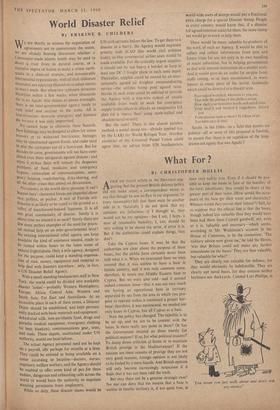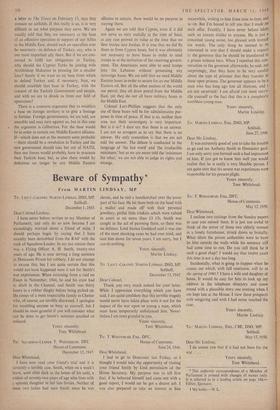What For ?
By CHRISTOPHER HOLLIS
Fruit my recent article in the Spectator sug- IliBesting that the present British defence policy did not make sense, a correspondent wrote to say that though he saw no flaw in my argument, hc (very reasonably) felt that there must be another side to it. Naturally 1 do not think that my opinions are fallacious:--if I thought so, they would not be my opinions—but I am, I hope, a man of reasonable humility; I, too, should be very willing to be shown my error, if error it is. But if the authorities could explain things, they don't.
Take the Cyprus bases. It may be that the authorities are clear about the purpose of these bases,. but the public have certainly never been told what it is. When we evacuated Suez we were assured that it was useless to have a base in hostile country, and it was only common sense, therefore, to move our Middle Eastern base to Cyprus. But we were also told--and it seemed indeed common sense—that it was not very much use having an operational base in territory separated by sea from the area in which you pro- pose to operate unless it contained a proper har- bour; therefore, it was maintained, we needed not only bases in Cyprus, but all Cyprus as a base.
Now the policy has changed. The republic is to be set up, and we are to be content with the bases. Is there really any point in them? Or has the Government insisted on them merely for political reasons? If so, for what political reasons? To damp down criticism at home or to maintain British prestige in the Mediterranean? If the reasons are mere reasons of prestige they are not very good reasons; foreign opinion is not likely to be fooled by a mere facade. And British opinion will only become increasingly suspicious if it finds that it has not been told the truth.
But may there not be a genuine strategic case? No one can deny that the maxim that a base is useless in hostile territory is, if not quite true, at least very nearly true. Even if it should be pos- sible to keep the bases in face of the hostility of the local inhabitants, they would be shorn of the greater part of their value. (How would the occu- pants of the base get their water and electricity? Whence would they recruit their labour?) Still, let us suppose that the official line is that the bases, though indeed less valuable than they would have been had there been Cypriot goodwill, are, even as it is, valuable and necessary—which seems, according to Mr. Watkinson's account to the House of Commons, to be the contention; `The military advice now given me,' he told the House, `was that Britain could not make any further concessions on the bases.' They are then valuable, but valuable for what?
They are clearly not valuable for defence, for they would obviously be indefensible. They are clearly not naval bases, for they contain neither harbours nor dockyards. Colonel Lort-Phillips, in
'You mean von just walk about and don't win any money?'
a letter to The Times on February 13, says they contain no airfields. if this really is so, it is very difficult to see what purpose they serve. We are usually told that they are necessary as the base of an offensive operation in support of our Allies in the Middle East, should such an operation ever be necessary—in defence of Turkey, say, who is our most important ally there. But if we are con- cerned to fulfil our obligations to Turkey, why should the Cypriot Turks be joining with Archbishop Makarios in pressing for a smaller area? Surely if we want an air base from which to defend Turkey and, if necessary, Iran, we should establish that base in Turkey, with the consent of the Turkish Government and people, and with no sea to divide us from our field of operations?
There is a common argument that to establish a base on foreign territory is to give a hostage to fortune. Foreign governments, we are told, are unstable and may turn against us, but in this case the argument is Gilbertian. For the base would be in order to sustain our Middle Eastern alliance. If—which does not at the moment seem probable —there should be a revolution in Turkey and the new government should take her out of NATO, then our forces would probably have to evacuate their Turkish base, but, as also there would by definition no longer be any Middle Eastern alliance to sustain, there would be no purpose in staying there.
Again we are told that Cyprus, even if it did not serve us very usefully at the time of Suez, at any rate proved its value at the time that we flew troops into Jordan. It is true that we did fly. them in from Cyprus bases, but it was obviously not necessary to have bases in order to send troops in at the invitation of the receiving govern- ment. The Americans were able to send troops into the Lebanon without possessing any sovereign bases. We are told that we need Middle Eastern bases in order to secure for us our Middle Eastern oil. But all the other nations of the world use petrol; they all draw petrol from the Middle East, yet they do not all have military bases in the Middle East.
Colonel Lort-Phillips suggests that the only use of these bases will be for administrative pur- poses in time of peace. If that is so, neither their area nor their sovereignty is very important. But is it so? I dare say that there is an answer. I am not so arrogant as to say that there is no answer. My only contention is that we are not told the answer. The debate is conducted in the language of 'the last word' and 'the irreducible minimum,' but as we are never told the `minimum for what,' we are not able to judge its rights and wrongs.











































 Previous page
Previous page